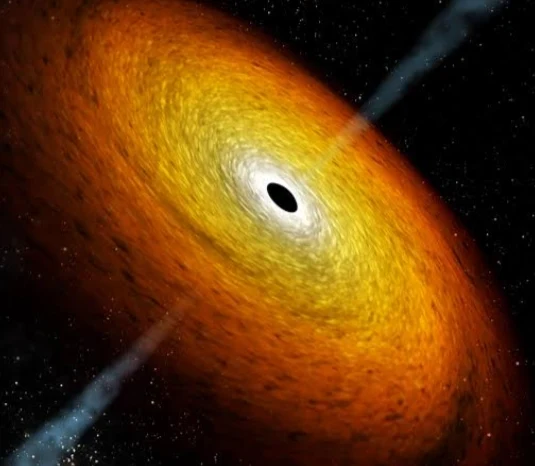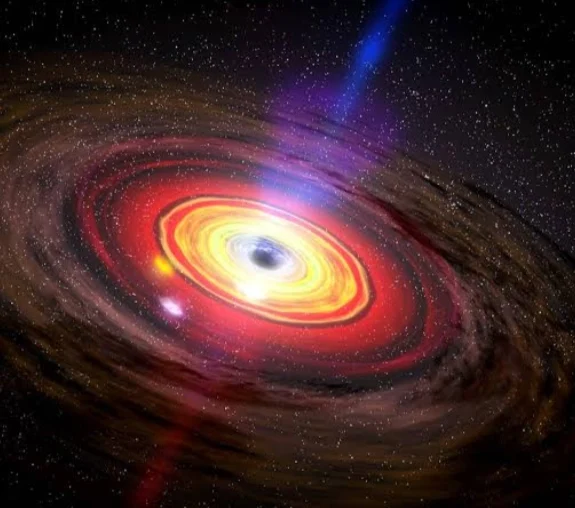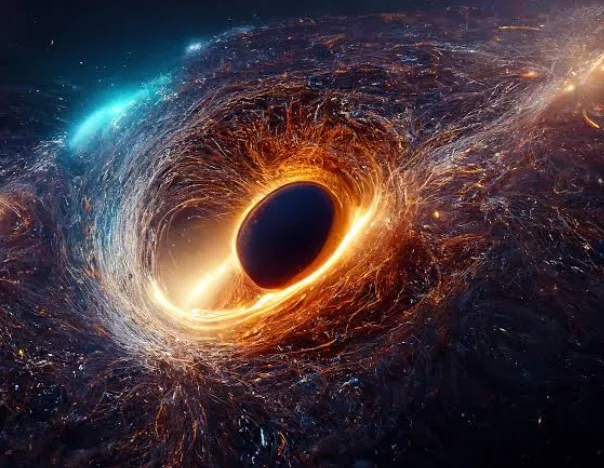Revolutionizing Black Hole Research
What is Black Hole?
A black hole is a fascinating and mysterious object in the universe, known for its immense gravity that not even light can escape.
Here's a breakdown:
What it is:
- A region of spacetime with extremely intense gravity. Imagine squishing a massive star into a tiny point, that's essentially what happens at the center of a black hole.
- The gravity is so strong that nothing can escape its pull, not even light, the fastest thing in the universe.
- Black holes don't have a surface like a planet or star. They are defined by a boundary called the event horizon, the point where the escape velocity exceeds the speed of light.
How they form:
- Black holes are formed when massive stars collapse at the end of their lives. As the star runs out of fuel, its core can no longer withstand its own gravity, leading to a powerful implosion.
- Smaller black holes can also form from the collapse of very dense stars called neutron stars.
What we know about them:
- We can't directly observe black holes because light can't escape them. However, we can indirectly detect them by observing their effects on their surroundings.
- For example, we can see stars orbiting something invisible with incredible speed, suggesting a massive object like a black hole is influencing their motion.
- Recently, we even captured the first ever image of a black hole, thanks to a global network of telescopes working together.
What we don't know:
- There are still many mysteries surrounding black holes, such as what happens to matter and energy that falls into them, and whether there are other types of black holes beyond what we currently understand.
How to Detected Black Hole?
Black holes, due to their nature of not emitting light, are incredibly difficult to directly detect. However, scientists use several clever methods to indirectly detect and study them based on their influence on their surroundings:
1. Studying the behavior of nearby stars:
- When a star orbits an unseen object at incredible speeds, exceeding the expected orbital velocity for its mass, it hints at the presence of a massive, invisible object like a black hole. By observing the star's orbital motion and calculating the mass of the unseen object, astronomers can determine if it's likely a black hole. This method is called Doppler shift.
2. Observing Accretion Disks:
- Black holes often have surrounding disks of gas and dust called accretion disks. As matter falls into the black hole, it spirals around it, forming this disk. The intense friction within the disk heats the matter to extreme temperatures, causing it to emit light across various wavelengths, including X-rays and radio waves. By observing these emissions, astronomers can identify the presence of a potential black hole.
3. Gravitational lensing:
- Black holes have such immense gravity that they can bend the very fabric of spacetime, which affects the path of light passing nearby. This phenomenon, called gravitational lensing, can magnify or distort the image of objects behind the black hole. By analyzing these distortions, astronomers can infer the presence and mass of a black hole.
4. Event Horizon Telescope:
- This recent technological marvel is a global network of radio telescopes working together as one giant telescope. This collaboration allows them to achieve unprecedented resolution, enabling scientists to capture the first-ever image of a black hole's event horizon in 2019. This image provided definitive evidence for the existence of black holes.
It's important to remember:
- These methods provide indirect evidence for black holes, not a direct "picture" like we can see with stars or planets.
- Different methods can be used together to confirm the presence and learn more about the properties of a black hole, such as its mass, spin, and surrounding environment.
These methods continue to be refined as technology advances, allowing us to explore the universe's most enigmatic objects further and unveil the mysteries surrounding black holes.
Age of Black Hole?
The age of a black hole is a challenging concept to answer definitively. While we can estimate their formation times based on observations and theories, it's important to understand the limitations:
Challenges in determining age:
- We cannot directly measure a black hole's age. Since they don't emit light or interact with matter in usual ways, we can only estimate their formation time based on indirect observations and theoretical models.
- Black holes can grow over time by accreting matter from their surroundings. Therefore, their age might not solely represent their initial formation time.
Current knowledge:
- Older galaxies, formed closer to the Big Bang, are believed to harbor some of the oldest black holes. Recent discoveries like the supermassive black hole at the center of the galaxy GN-z11, estimated to exist 470 million years after the Big Bang, push the boundaries of our understanding.
- Other methods like studying the evolution of galaxies and their co-existence with black holes can provide clues about the formation eras of these cosmic giants.
It's important to note:
- These are estimates based on current knowledge and may change as our understanding of black hole formation and galactic evolution evolves.
- Saying a black hole is "X years old" might not be entirely accurate, as their growth and interaction with the environment can blur the lines between formation and current state.
If you're interested in specific examples of black holes with estimated ages:
- The aforementioned supermassive black hole in GN-z11, with an estimated age of 470 million years after the Big Bang.
- Another contender, a black hole candidate observed using the Hubble Space Telescope, is estimated to be around 13 billion years old, nearly as old as the universe itself.
Remember, these are just a few examples, and the field of black hole research is constantly evolving, leading to new discoveries and updated age estimates.
How many black holes are there in the observable universe?
40 quintillion is the current estimated number of black holes in the observable universe, but there's definitely more to delve into when considering the details!
Here's a breakdown:
Estimated number:
- Total: 40 quintillion (4 x 10^19)
- Stellar-mass black holes: Around 90%, which translates to roughly 3.6 x 10^16
- Supermassive black holes: Around 10%, which translates to roughly 4 x 10^15
Distribution:
- Most galaxies: Harbor supermassive black holes at their centers, with masses ranging from millions to billions of times our Sun.
- Our Milky Way: Estimated to have around 100 million stellar-mass black holes, but only a dozen have been confirmed so far.
- Globular clusters: Dense regions within galaxies containing a higher concentration of black holes.
Formation:
- Stellar-mass black holes: Formed from the collapse of massive stars after they exhaust their fuel.
- Supermassive black holes: Formation mechanisms are still debated, but possibilities include the rapid growth of smaller black holes or the direct collapse of massive gas clouds in the early universe.
Uncertainties:
- Direct observation: Black holes are invisible due to their immense gravity preventing light from escaping.
- Estimation methods: Rely on models and indirect observations, like stellar motions or accretion disks, which have limitations.
Future advancements:
- New telescopes and technologies: Could lead to more accurate black hole detections and refined estimates.
- Gravitational wave observations: Offer unique insights into black hole mergers and their properties.
Remember:
- This is a dynamic field with ongoing research and discoveries.
- The 40 quintillion estimate is based on current understanding and may change in the future.
Big Data: Revolutionizing Black Hole Research
The vast and ever-growing field of Big Data is playing a crucial role in revolutionizing the way we study black holes, those enigmatic and powerful objects lurking in the depths of the universe. Here's how:
1. Unveiling Hidden Patterns:
- Massive datasets from ground-based telescopes, space observatories, and future missions generate a staggering amount of information.
- Big data facilitates the analysis of complex patterns in these datasets, which might be missed by traditional methods. This allows researchers to detect subtle changes in black hole behavior, revealing insights into their formation, evolution, and interactions with their surrounding environment.
2. Multi-Messenger Astronomy:
- Studying black holes requires combining data from various sources, like radio waves, X-rays, gamma rays, and gravitational waves.
- Big data tools help correlate and analyze this multi-messenger data simultaneously, providing a more holistic understanding of black hole phenomena.
3. Simulating Black Holes:
- Computational models are crucial to study black holes, as they are too distant and powerful for direct observation.
- Big data enables the creation of more sophisticated and realistic simulations, accounting for complex physical processes within and around black holes, leading to a deeper theoretical understanding.
4. Faster Discovery and Classification:
- Big data algorithms can automate the process of identifying black hole candidates in vast quantities of observational data.
- This significantly streamlines the discovery process, allowing researchers to focus on promising candidates and accelerate the pace of black hole research.
Challenges and Opportunities:
While big data holds immense promise, it also presents significant challenges:
- Data storage and management: Storing and managing the petabytes of data generated requires advanced infrastructure and efficient processing methods.
- Data analysis expertise: Analyzing and interpreting complex data sets necessitates expertise in data science and astrophysics, requiring a collaborative approach between different disciplines.
Despite these challenges, the future of black hole research is undoubtedly intertwined with big data. As technology advances, we can expect even more groundbreaking discoveries and revelations about these fascinating objects that continue to capture the imagination of scientists and the public alike.










